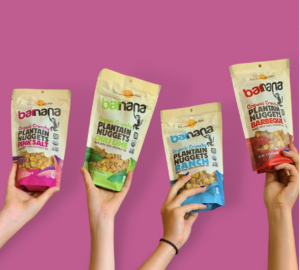If you were walking on a small farm managed by an Indigenous woman in the Amazon jungle, you might not realize it until she pointed out her crops to you. There are no rows, no chemicals, no straight lines of one type of plant stretching off into the distance. Among her food and medicinal crops, wild plants and animals are free to exist. Farming this way, in a truly traditional, regenerative, responsive cycle, creates a cascade of benefits for people, soil and the local ecosystem.
Sadly, the organic crops grown in these environments are often difficult to transport to market, and when they do get there, they have to compete with homogenized food from big, monocrop farms. For all of the ecological services the Indigenous farmer is doing for the forest and the world by working her land in a regenerative way, she is often barely able to support her family.

When Barnana began working with Indigenous women in the Amazon, it was initially simply to source the best quality plantains for organic plantain chips. Now, through direct relationships developed over time, Barnana collaborates with the farmers to guarantee them a dependable market, a predictable income and a brighter future. Drop-off sites stationed along the banks of the Amazon River mitigate transportation issues, local processing sites create jobs and a Barnana production facility in-country means the shortest possible distance from the Amazon forest – to a shelf at your local grocery store in the United States.
Waste Not, Snack a Lot
From being one of the first companies to take on upcycling to innovative recipes that further reduce waste, Barnana's adaptations along the supply chain have been a direct result of observation and response.
The impact of waste on farmer income and cost to the planet led to Barnana’s original Organic Banana Bites. Why waste bananas when you can sun-dry them and make perfect nutrient-dense, sweet and natural fruit snacks?
Alternatively, how can we support the farmers with the best plantains in the world when they are unable to access markets? The unique pressures on the people who live where Barnana’s crops are grown and processed into simple, sustainable snacks led to the creation of drop off sites and processing centers that are easily reachable — providing guaranteed prices, new jobs and predictable incomes.
The benefits of doing business in a responsive way, in a way that nurtures the Earth and its people, can be difficult to quantify. What we know is that through ongoing collaboration with small Indigenous farms in the Amazon, many tons of crops that would have been wasted have been rescued. Hundreds of farming families have been empowered and paid guaranteed prices. Farmers who have received support from Barnana in the organic certification process are now selling their crops for more than ever before and families and communities that were struggling on the margins are now securely operating in the mainstream economy.
The Future of Food
Barnana is not satisfied to tell its story as an unequivocal “win” for people and planet. In a long, hard, honest look at the variety of impacts even a small business has on its environment, the subject of organic waste needed to be addressed again. Plantain peels were seriously piling up at the factory. Recipe experiments led by the local team in Ecuador revealed that the plantain could be sliced whisper-thin with the peel ON and quickly fried in 100% organic coconut oil for a new, delicious, curiously dome-shaped chip. The extra benefit of a boost of fiber was just a plus along the way! And so the most recent and highly delicious Barnana product was born — Barnana Scoops.
The Barnana Scoops story is about the kind of innovation that's possible when you pay honest attention to what’s happening around you, listen respectfully to people closest to the land and pursue sustainable solutions to the world’s most pressing problems. Starting right where you are – and aiming for an always-improving future.
This guest post is written by Barnana.
